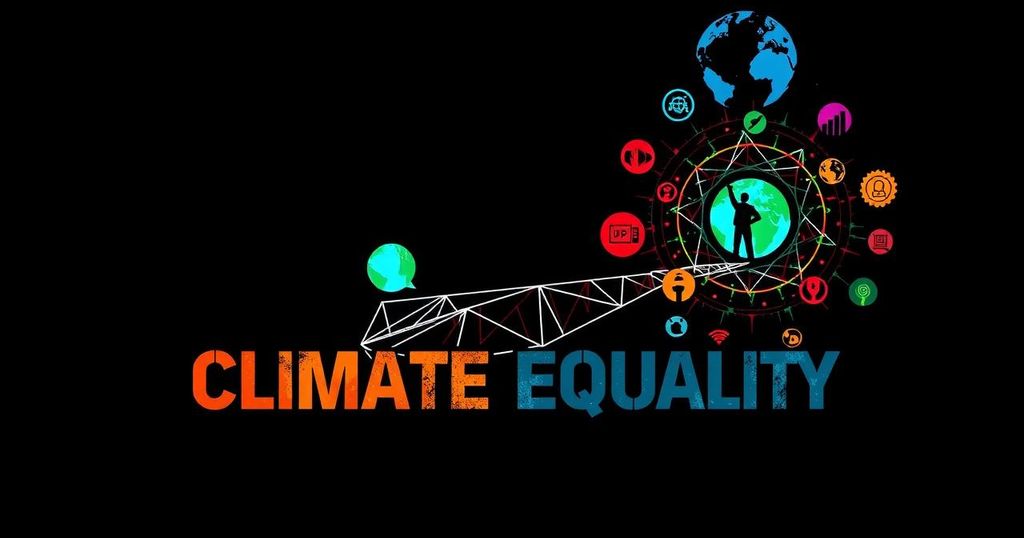Highlighting Climate Inequality at COP29: The Case for Justice in Action
COP29 must highlight climate inequality, as the Global South suffers from climate change’s effects despite contributing the least to its causes. Wealthier nations have historically exploited resources, and urgent financial and technological support is required for these affected nations to develop sustainably. The need for climate justice emphasizes equitable resource distribution and participation in global climate initiatives as essential for effective action.
Climate inequality must be prioritized in discussions at COP29, as those most affected by climate change contribute the least to its causes while possessing minimal resources to mitigate its effects. For centuries, affluent nations exploited the Earth’s resources, accruing wealth at the expense of poorer nations, particularly those in the Global South, including regions like Africa, Asia, Latin America, and the Caribbean. Alarmingly, the wealthiest 10 percent contribute nearly half of the world’s greenhouse gas emissions, whilst the lower half of the global population, primarily from developing nations, accounts for only 12 percent. The recent election of a climate skeptic in the United States represents a substantial hurdle for climate initiatives, while the activities of COP29 host Azerbaijan suggest an emphasis on fossil fuel deals rather than climate action. The extreme climatic events of droughts, floods, and wildfires are disproportionately affecting the Global South, thus highlighting the urgent need for just transitions and climate justice. Despite some progress in international climate policy through the COP accumulation, the attention to climate justice remains inadequate. As a legal historian involved in a UN project aimed at identifying challenges and practices to combat climate injustice, I presently engage with various stakeholders during COP29 to present preliminary findings. This gathering represents a pivotal moment to focus on integrating climate justice into the global fight against climate change. The principle of climate justice recognizes that those who have gained the most from carbon-intensive development bear the ethical duty to curb emissions and support the nations most affected by climate challenges. Developing countries are beginning their industrial revolutions but face practical challenges in bypassing environmentally damaging strategies that wealthier nations are abandoning. They require substantial assistance through climate finance and technology transfer. Although developed nations pledged US$100 billion annually by 2020 to support climate efforts in the Global South, they only fulfilled this promise two years later. To establish genuine climate justice, we must embrace a fair approach to resource allocation that incorporates the voices and needs of disadvantaged nations. Going beyond existing frameworks like the Green Climate Fund, we must advocate for reforms in international trade and global governance to guarantee equity. The notion of enlightened self-interest may spur action in wealthier nations, given that climate-related disasters are generating climate refugees who strain resources in the Global North. By assisting the Global South in addressing climate-induced crises, developed countries could prevent these individuals from becoming displaced. As COP29 approaches discussions centered on financing climate action for low-income nations, UN Secretary-General António Guterres emphasized that climate finance represents a collective investment rather than an act of charity. This conference provides a renewed opportunity to underscore the significance of climate justice, demanding equitable financing for mitigation and adaptation strategies. Without immediate and comprehensive measures, the prospect of an effective response to climate change remains increasingly precarious.
The issue of climate inequality centers on the disproportionate impacts of climate change, which are felt most acutely by those who have contributed the least to the crisis. Historical exploitation by wealthier nations has led to significant inequalities in resource allocation and responsibility for emissions. Current dynamics, especially with the rise of climate skeptics in leadership positions and contrasting interests at international climate conferences, further complicate the dialogue. Recognizing the ethical and practical implications of these inequities, there is an urgent need to bring attention to climate justice, especially for developing nations seeking to advance without resorting to harmful carbon-intensive practices.
In conclusion, COP29 serves as a crucial platform to address climate justice by highlighting the disparities in emissions responsibility between wealthy and developing nations. This conference must transform its dialogue to include equitable solutions and considerations for those most affected by climate change. Aligning climate finance with the principles of fairness will be essential for fostering a global response that not only mitigates climate impacts but also upholds the rights and needs of vulnerable populations. The collective future hinges on our ability to balance development and sustainability, ensuring that no nation or community is left behind in the fight against climate change.
Original Source: theconversation.com




Post Comment